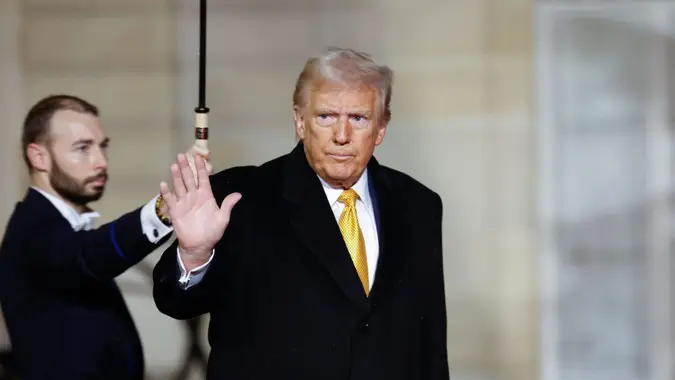3 Reasons Congress Is More Important to Your Finances Than President Trump in 2025

Commitment to Our Readers
GOBankingRates' editorial team is committed to bringing you unbiased reviews and information. We use data-driven methodologies to evaluate financial products and services - our reviews and ratings are not influenced by advertisers. You can read more about our editorial guidelines and our products and services review methodology.

20 Years
Helping You Live Richer

Reviewed
by Experts

Trusted by
Millions of Readers
The United States has a history of charismatic presidents — the Roosevelts, John F. Kennedy, Ronald Reagan, Barack Obama and President-elect Donald Trump. However, who occupies the White House is less important than the party controlling Congress when it comes to your wallet.
“Contrary to public perception, the President of the United States’ power to make tax, healthcare and other changes to federal laws is limited,” said Dustin Siggins, a former Capitol Hill journalist and the owner of the PR and public affairs firm Proven Media Solutions. “President-elect Trump will not be able to renew tax laws on his own, any more than President Biden was able to enact across-the-board student loan forgiveness without Congress’ involvement.”
Here are threereasons Congress is more important to your finances than Trump in 2025.
Historical Market Trends
A CNBC analysis of data from 1951 through 2023 provided by the Carson Group found that stocks tend to perform better under a divided government.
For example, the S&P 500 had an annual average return of 8% under a single-party rule, compared to a 9.9% average gain under bipartisan control of the federal government. According to CNBC, investors experienced an average yearly gain of 15.7% under Democratic presidents and 13.7% under Republican presidents.
“The stock market has tended to perform better with divided government, but these trends tend to mask the more important fundamentals,” said Wayne Winegarden, an economist at Pacific Research Institute. “Sustainable stock market performance is enhanced by stable fiscal, monetary, trade and regulatory policies. When policies veer from these fundamentals, long-term performance suffers.”
Nevertheless, Congress wields considerable power, said David Materazzi, CEO of Galileo FX, an automatic trading platform. Materazzi has more than 15 years of executive experience in the equity and currency markets.
“Congress pulls the strings in banking, healthcare and energy,” Materazzi said. “One law can create winners or destroy companies overnight. If you’re not watching, you’re walking blindfolded into traffic.”
Congress Controls Spending
While Trump will set the national agenda through his economic proposals, Congress, in most cases, will decide whether Trump’s policies become law.
“Congress’ makeup is critical, because economic policies that impact retirement programs, healthcare policies, education, taxes and foreign affairs are impacted by Congress’ ability to pass legislation,” Siggins said. “And without passed legislation, the president’s powers are limited.”
Conventional wisdom assumes that a single-party-controlled government means that its more aggressive economic and spending policies will prevail. However, that’s not always the case.
“Partisan makeups matter for this reason — but so do the coalitions inside the partisan divide,” Siggins explained. “The House is Republican-led, but it has a lot of moderates who may hold up immigration or pro-life legislation. To add to the complications, Congress’ power may now be increased because of the SCOTUS (Supreme Court of the United States) Chevron decision, which removed some executive branch powers.”
Economic and spending policies that affect consumer finances in 2025 may also depend on how moderate Congressional Republicans vote.
“If they go along with the MAGA wing of the party, then President-elect Trump will have an opportunity to implement several key policies,” Winegarden said. “The question is ‘What will those policies be?'”
Congress Determines Tax Laws
The President-elect has consistently advocated for continuing or making permanent many of the tax cuts enacted during his first term, which are set to expire this year.
Trump has also called for increasing the state and local tax (SALT) deduction cap, currently capped at $10,000, and exempting tips from federal taxes. However, the impact on consumers depends on which policies Congress prioritizes.
“Congress must consider legislation, hold hearings, pass proposed bills through subcommittees and committees and both chambers, and bring passed bills to the president for signing,” Siggins said.
Winegarden said Congress should prioritize keeping the current tax code in place while preventing tax increases on personal income, corporate income and capital gains.
“Raising the SALT deduction, exempting tips from taxes or raising tariffs will all reduce the incentives for growth and reduce income growth and employment opportunities for families,” Winegarden said.
Editor’s note on political coverage: GOBankingRates is nonpartisan and strives to cover all aspects of the economy objectively and present balanced reports on politically focused finance stories. You can find more coverage of this topic on GOBankingRates.com.
 Written by
Written by  Edited by
Edited by 

























